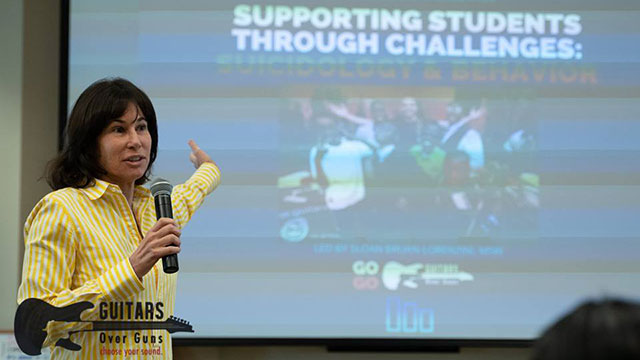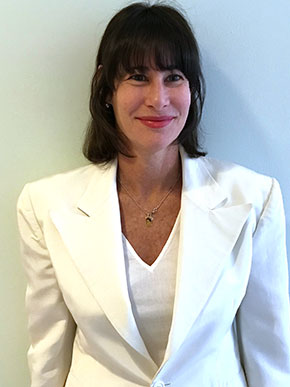Five Questions for Sloan Bruan-Lorenzini


Miami-based clinical social worker Sloan Bruan-Lorenzini is on a mission to transform this city one child at a time. Crediting her early days on Wall Street as a training ground, Bruan-Lorenzini develops and delivers psychological programs to non-profits through her company, Special Needs Solutions. Her pioneering work at the nonprofit Guitars Over Guns involves supporting mentors of middle school music students, who in turn train to become mentors — creating a ripple effect that bolsters whole communities. Social Miami’s Gemma Berry recently sat down with Bruan-Lorenzini to learn about what she’s doing and where she’s going.
You’re a clinically trained social worker?
Actually I call myself a “mental gymnast.” I teach to my clients something I call mental gymnastics, which involve viewing problems as hurdles. They present themselves for two purposes: being overcome and manifesting personal growth. I teach people to view the situation from different perspectives. There is a saying: if you want different results do it differently.
How exactly did working on Wall Street help you train for this?
As a good capitalist, I was very interested in learning what it was like to work in the stock market. I was also interested in psychology. Wall Street was a very free environment where you were able to express yourself verbally. It is the complete opposite of the library. The environment is very aggressive and mostly male. You had to really be verbally and emotionally tough.
When did you know that helping people was your calling?
Turns out, when I was 12 years old. An old childhood acquaintance reminded me that I was captain of our tennis team out in Long Island. Once, we went to play at a club where my teammate was unwelcome because she was black. I said very clearly, “If she can’t play I’m not playing.” And they let her play. When my friend reminded me, I thought to myself “That’s the real me.” Maybe part of me could be on a trading desk running a business. But the real me is just doing something that supports people.
What inspired you to become involved with the nonprofit Guitars Over Guns?
The organizers there contacted me because the mentors do not typically have mental health training. They are wonderful with the children and they are musicians who are dedicated to helping children. I know that one of the greatest resources a child could have is one adult who cares about them. Guitars Over Guns recognizes this — they go into schools where arts programming has been cut and deliver music education and mentorship. But I wanted to offer more than counseling.
What to you is the most profound result of the program?
Although there are beautiful success stories of children who were not considering earning bachelor’s degrees but are now currently enrolled in college, many express that they have enhanced relationships as a result of their involvement with the nonprofit. It is often the frequency and depth of less obvious successes that touch my heart and confirm the profound value of the work.
I choose social work because in social work it’s not about “pathologizing” people. People aren’t sick. We have challenges. We have distress. We have problems. And some of its from society. Though of its from biology and environment.


